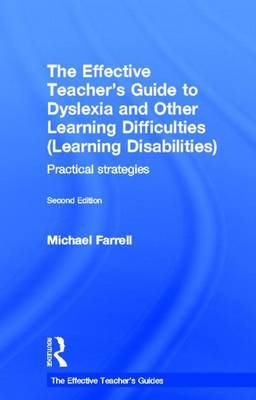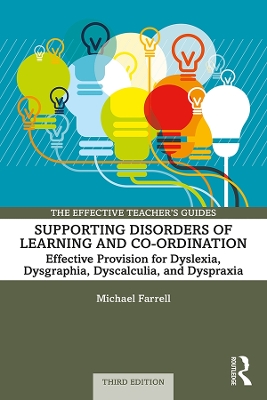The Effective Teacher's Guides
10 total works
The Effective Teacher's Guide to Behavioural and Emotional Disorders
by Michael Farrell
'Michael Farrell offers well sourced overviews of the conflicting and contradictory advice that is available to schools, suggests a variety of solutions to challenges, empowering the reader to make their own choices.' - Carol Smart, Special Needs Information Press
Fully updated with the latest research and advice on best practice, this new edition of The Effective Teacher's Guide to Behavioural and Emotional Disorders covers a range of conditions that cause learning difficulties for children, including disruptive behaviour, attention deficit hyperactivity disorder, anxiety and depressive disorders. The theoretical underpinning is fully updated but also condensed in this edition to make way for more practical strategies for teachers.
Teachers are likely to meet children with varying types and degrees of emotional behavioural disorders. This comprehensive guide equips you with informed and practical strategies to ensure that all pupils are included and provided for in the best possible way. The new edition has also been adapted to be more widely relevant to readers in different countries, focusing more on the strategies that work regardless of national context.
Writing in his popular accessible style, Michael Farrell suggests the best ways of dealing with a variety of conditions, always with practical classroom situations in mind. In each section, the book:
- sets out the definitions of the condition
- looks at the range of provision
- suggests intervention and support strategies
- gives points for reflection and suggested further reading.
Highly accessible and authoritative, this book provides teachers with an invaluable resource to help you create a truly inclusive classroom.
The Effective Teacher's Guide to Sensory and Physical Impairments
by Michael Farrell
'Michael Farrell offers well sourced overviews of the conflicting and contradictory advice that is available to schools, suggests a variety of solutions to challenges, empowering the reader to make their own choices.' - Carol Smart, Special Needs Information Press
Fully updated with the latest research and advice on best practice, this new edition of The Effective Teacher's Guide to Sensory and Physical Impairments covers a range of conditions that cause learning difficulties for children, including visual impairment, hearing impairment, deafblindness, orthopaedic impairment, motor disorders and health impairments, as well as a brand new chapter on traumatic brain injury.
Teachers are likely to meet children with varying types and degrees of sensory and physical impairments. This comprehensive guide equips you with informed and practical strategies to ensure that all pupils are included and provided for in the best possible way. The new edition has also been adapted to be more widely relevant to readers in different countries, focusing more on the strategies that work regardless of national context.
Writing in his popular accessible style, Michael Farrell suggests the best ways of dealing with a variety of conditions, always with practical classroom situations in mind. In each section, the book:
- explains the legal contexts
- looks at the range of provision
- suggests intervention and support strategies
- gives points for reflection and suggested further reading.
Highly accessible and authoritative, this book provides teachers with an invaluable resource to help you create a truly inclusive classroom.
The Effective Teacher's Guide to Autism and Communication Difficulties
by Michael Farrell
The Effective Teacher's Guide to Moderate, Severe and Profound Learning Difficulties (Cognitive Impairments)
by Michael Farrell
Written with the busy practitioner in mind, the author draws on his extensive specialist knowledge to offer a sensible, workable and practical approach for any teacher who wishes to understand and promote effective classroom inclusion for children with learning difficulties. Concentrating on the realities of teaching and learning, this book:
- places learning difficulties in the context of policy and law
- examines and explains the relevant terms and definitions
- puts forward suggestions for provision
- looks at ways of assessing and raising achievement
- offers strategies to develop an inclusive, responsive environment.
The Effective Teacher's Guide to Dyslexia and Other Learning Difficulties
by Michael Farrell
The Effective Teacher's Guide to Dyslexia and other Learning Difficulties (Learning Disabilities)
by Michael Farrell
Offering valuable practical advice, this book provides the ordinary classroom teacher with enough information to equip them with a range of strategies to tackle everyday classroom situations. This book expertly guides the reader through:
- legal and policy contexts
- terms and definitions
- interventions and rationale
- approaches related to different curriculum subjects
- provision for dyscalculia and acalculia.
Taking into account recent policy changes, and with an emphasis on what works in the classroom, this book will prove a practical, readable and invaluable resource for the busy practitioner.
This revised and updated third edition, previously titled The Effective Teacher's Guide to Dyslexia and Other Learning Difficulties (Learning Disabilities), unravels the complexity of specific learning difficulties in an accessible and user-friendly way.
Each chapter provides key information about the disorder in question, giving a clear definition before discussing prevalence, causal factors, identification, and assessment and provision. Implications for the curriculum and related assessment, pedagogy, resources, therapy/care, and school and classroom organisation are explained, allowing providers to reflect and adapt their practice in response to the needs of the individual. The book informs effective provision, with the aim of encouraging the best achievement and personal and social development for children and young people.
The book authoritatively and lucidly addresses issues associated with
• impairment in reading/dyslexia,
• impairment in written expression/dysgraphia,
• impairment in mathematics/dyscalculia, and
• developmental co-ordination disorder/dyspraxia.
Recognising the importance and the challenge of multi-professional working, the book relates provision to the roles of parents and carers alongside that of the practitioner. Underpinned by research and widely held professional judgement, this will prove a practical, readable, and inspiring resource for professionals in the UK, US, and elsewhere including teachers, therapists, psychologists, and students entering these professions.


